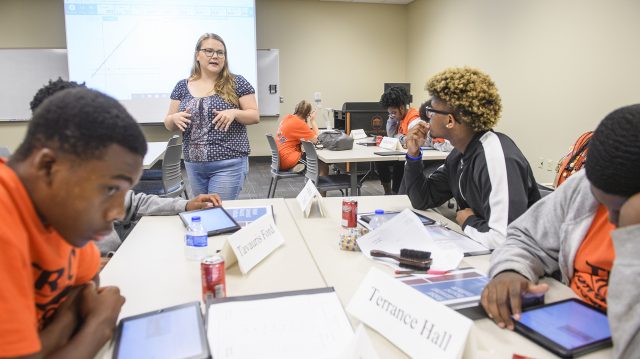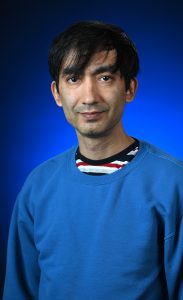
A graduate student in the UM Center for Mathematics and Science Education instructs Rebel Upward Bound Institute students during a classroom session in 2018. A $400,000 National Science Foundation CAREER Grant will allow Rizwanur Khan, assistant professor of mathematics, to continue the institute, a summer mentoring program for students in Calhoun and Yalobusha counties. Photo by Thomas Graning/Ole Miss Digital Imaging Services
OXFORD, Miss. – The mathematics behind prime numbers, which have been studied since the time of the ancient Greeks and which form the foundation of secure data transfer in computer science, is dictated by a highly complex set of objects called L-functions.
Yet the academic world’s understanding of these functions and their utility is still growing, despite being the subject of numerous studies since they were discovered about 200 years ago.
Rizwanur Khan, assistant professor of mathematics at the University of Mississippi, plans to further this study over the next five years using a $400,000 National Science Foundation CAREER grant. Khan is the first professor in the Department of Mathematics to be chosen for an NSF CAREER Mathematics grant, according to the foundation’s records.
The CAREER grant, one of the foundation’s most prestigious awards, supports early-career faculty who can be role models in education and research and further the mission of the department or organization with whom they work.
“The project is focused on the research of ‘L-functions,’ which encode information about some of the most mysterious objects in number theory,” said Khan, who joined the Ole Miss faculty in 2018. “The general goal for any researcher is simply to do interesting research, and I believe that the support from this grant will enable me to do exactly that.”
L-functions are special mathematical functions with several symmetries that encode information about objects in number theory, such as prime numbers and waves, Khan said. Mathematicians try to decode and extract this information by studying L-functions and their properties.
“The goal of my research will be to make progress on our understanding of L-functions,” Khan said. “This in turn can have applications to our understanding of prime numbers and waves.”
A part of the grant will be used to help continue the Rebel Upward Bound Institute, a summer youth education program for high school students in Calhoun and Yalobusha counties. Through the program, which Khan organizes, students learn to tackle complex problems, such as calculating the circumference of the Earth by following the Walk of Champions and measuring the height of campus buildings using the same mathematics that ancient Egyptians used to measure the Pyramids.
“The really neat thing about this award is that it allows one of the best mathematicians in the world to interact with and inspire Mississippi young adults,” said Talmage James Reid, chair of the Department of Mathematics.
Matthew Zediker, a graduate student from Oxford in the UM mathematics department, assisted Khan with RUBI this past summer. The students met twice a week for four weeks. While the students were at first nervous, they slowly became comfortable with working and asking questions about complex problems, Zediker said.
“It’s important to introduce these opportunities to everyone,” he said. “The value in it is showing them that some of these things that seem impossible or inaccessible aren’t.
“There were a lot of really bright students who thought that they couldn’t do it. When they kept practicing and learned they could, I didn’t realize how fun that aspect of teaching would be.”
Reid described Khan as a calm, supportive professor and “a well-rounded faculty member willing to work on the hardest problems in mathematics while focusing on his undergraduate and graduate students and providing essential outreach to the K-12 community.”
CAREER grants in mathematics are difficult to acquire, as the field is one of the oldest and most-studied in academia, Reid said.
“It’s an area of research that is central in mathematics today,” Reid said. “The NSF CAREER grant puts him in the company of the top mathematicians in the world.”
This material is based upon work supported by the National Science Foundation under Grant No. 630985.
